英语一般现在时结构归纳
- 格式:docx
- 大小:20.58 KB
- 文档页数:3
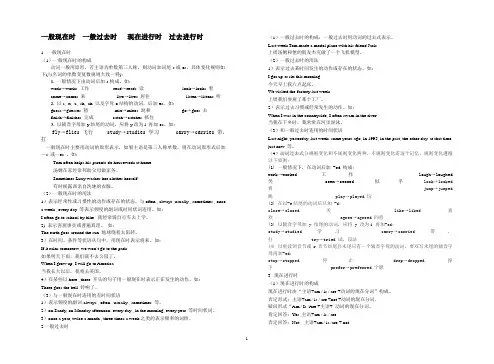
一般现在时一般过去时现在进行时过去进行时1. 一般现在时(1)一般现在时的构成动词一般用原形,若主语为单数第三人称,则动词加词尾-s或-es,具体变化规则如下(与名词的单数变复数规则大致一样):1.一般情况下由动词后加-s构成。
如:work→works 工作read→reads 读look→looks 看come→comes 来live→lives 居住listen→listens 听2.以s, x, z, sh, ch 以及字母o结构的动词,后加-es。
如:guess→guesses 猜mix→mixes 混和go→goes 去finish→finishes 完成catch→catches 抓住3.以辅音字母加y结尾的动词,应将y改为i 再加-es。
如:fly→flies 飞行study→studies 学习carry→carries 带,扛一般现在时主要用动词的原形表示,如果主语是第三人称单数,则在动词原形式后加—s 或—es 。
如:Tom often helps his parents do housework at home.汤姆在家经常邦助父母做家务。
Sometimes Lucy washes her clothes herself.有时候露西亲自洗她的衣服。
(2)一般现在时的用法1)表示经常性或习惯性的动作或存在的状态。
与often , always ,usually , sometimes , once a week , every day 等表示频度的副词或时间状词连用。
如:I often go to school by bike. 我经常骑自行车去上学。
2) 表示客观事实或普遍真理。
如:The earth goes around the sun .地球绕着太阳转。
3)在时间、条件等状语从句中,用现在时表示将来。
如:If it rains tomorrow, we won’t go to the park.如果明天下雨,我们就不去公园了。
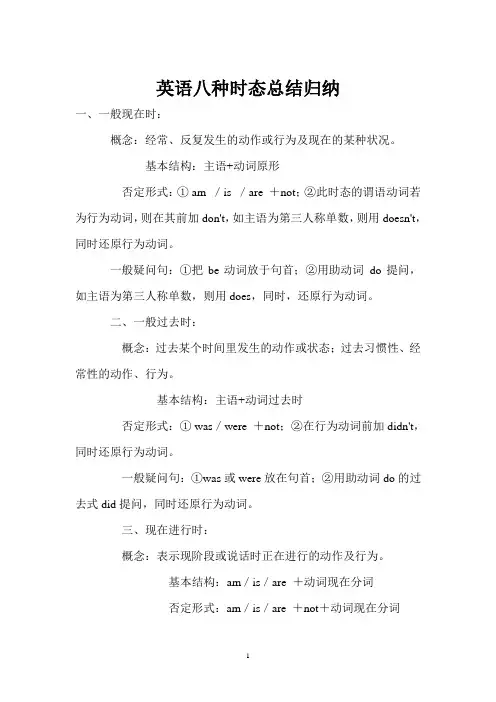
英语八种时态总结归纳一、一般现在时:概念:经常、反复发生的动作或行为及现在的某种状况。
基本结构:主语+动词原形否定形式:① am /is /are +not;②此时态的谓语动词若为行为动词,则在其前加don't,如主语为第三人称单数,则用doesn't,同时还原行为动词。
一般疑问句:①把be动词放于句首;②用助动词do提问,如主语为第三人称单数,则用does,同时,还原行为动词。
二、一般过去时:概念:过去某个时间里发生的动作或状态;过去习惯性、经常性的动作、行为。
基本结构:主语+动词过去时否定形式:① was/were +not;②在行为动词前加didn't,同时还原行为动词。
一般疑问句:①was或were放在句首;②用助动词do的过去式did提问,同时还原行为动词。
三、现在进行时:概念:表示现阶段或说话时正在进行的动作及行为。
基本结构:am/is/are +动词现在分词否定形式:am/is/are +not+动词现在分词一般疑问句:把be动词放在句首四、过去进行时:概念:表示过去某段时间或某一时刻正在发生或进行的行为或动作。
基本结构:was/were +动词现在分词否定形式:was/were +not+动词现在分词一般疑问句:把was或were放在句首五、现在完成时:概念:过去发生或已经完成的动作对现在造成的影响或结果,或从过去已经开始,持续到现在的动作或状态。
基本结构:have/has +动词过去分词否定形式:have/has +not+动词过去分词一般疑问句:have/has放于句首六、过去完成时:概念:以过去某一时间为标准,在此以前发生的动作或行为,或在过去某动作之前完成的行为,即“过去的过去”。
基本结构:had +动词过去分词否定形式:had +not+动词过去分词一般疑问句:had放于句首七、一般将来时:概念:表示将要发生的动作或存在的状态及打算、计划或准备做某事。
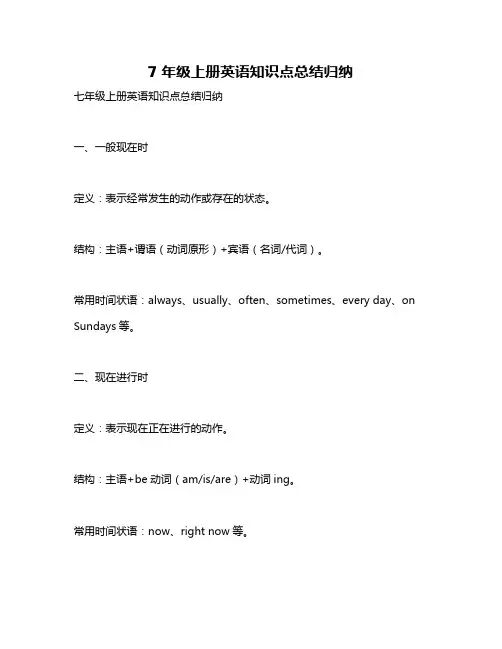
7年级上册英语知识点总结归纳
七年级上册英语知识点总结归纳
一、一般现在时
定义:表示经常发生的动作或存在的状态。
结构:主语+谓语(动词原形)+宾语(名词/代词)。
常用时间状语:always、usually、often、sometimes、every day、on Sundays等。
二、现在进行时
定义:表示现在正在进行的动作。
结构:主语+be动词(am/is/are)+动词ing。
常用时间状语:now、right now等。
三、一般过去时
定义:表示过去某个时间发生的动作或存在的状态。
结构:主语+谓语(动词过去式)+宾语(名词/代词)。
常用时间状语:yesterday、last night、two days ago等。
四、一般将来时
定义:表示将来某个时间发生的动作或存在的状态。
结构:主语+will+动词原形+宾语(名词/代词)。
常用时间状语:tomorrow、next week、in the future等。
五、介词的用法
表示时间的介词:at+具体时间点;in+年/月/季节;on+星期几/日期;for+时间段;since+时间点等。
表示地点的介词:in+大地点;at+小地点;in+地点+of+国家/城市等。
六、祈使句的用法
定义:表示请求、命令或建议的句子。
结构:动词原形+宾语+其他成分。
常用句型:Please+动词原形+宾语+其他成分;Let’s+动词原形+宾语+其他成分;动词原形+宾语+其他成分。
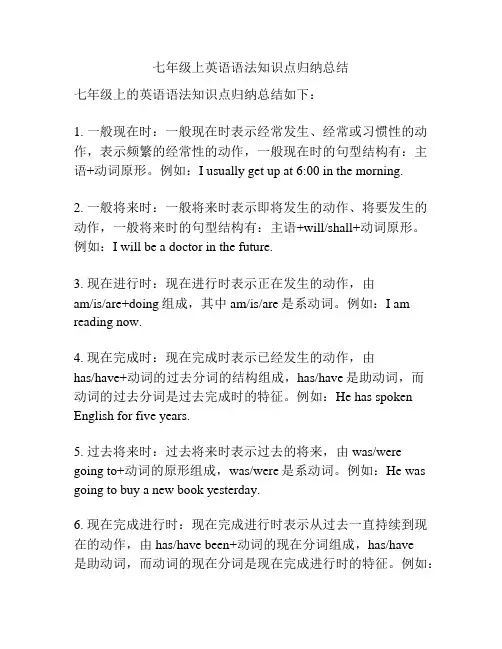
七年级上英语语法知识点归纳总结七年级上的英语语法知识点归纳总结如下:1. 一般现在时:一般现在时表示经常发生、经常或习惯性的动作,表示频繁的经常性的动作,一般现在时的句型结构有:主语+动词原形。
例如:I usually get up at 6:00 in the morning.2. 一般将来时:一般将来时表示即将发生的动作、将要发生的动作,一般将来时的句型结构有:主语+will/shall+动词原形。
例如:I will be a doctor in the future.3. 现在进行时:现在进行时表示正在发生的动作,由am/is/are+doing组成,其中am/is/are是系动词。
例如:I am reading now.4. 现在完成时:现在完成时表示已经发生的动作,由has/have+动词的过去分词的结构组成,has/have是助动词,而动词的过去分词是过去完成时的特征。
例如:He has spoken English for five years.5. 过去将来时:过去将来时表示过去的将来,由was/were going to+动词的原形组成,was/were是系动词。
例如:He was going to buy a new book yesterday.6. 现在完成进行时:现在完成进行时表示从过去一直持续到现在的动作,由has/have been+动词的现在分词组成,has/have是助动词,而动词的现在分词是现在完成进行时的特征。
例如:She has been writing for two hours.7. 过去进行时:过去进行时表示过去的某一段时间正在发生的动作,由was/were+动词的现在分词组成,was/were是系动词,而动词的现在分词是过去进行时的特征。
例如:I was doingmy homework at this time yesterday.8. 过去完成时:过去完成时表示过去发生的动作,由had+动词的过去分词组成,had是助动词,而动词的过去分词是过去完成时的特征。
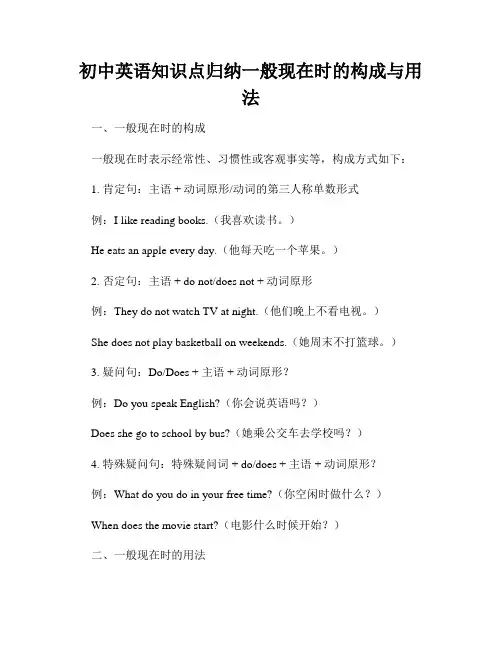
初中英语知识点归纳一般现在时的构成与用法一、一般现在时的构成一般现在时表示经常性、习惯性或客观事实等,构成方式如下:1. 肯定句:主语 + 动词原形/动词的第三人称单数形式例:I like reading books.(我喜欢读书。
)He eats an apple every day.(他每天吃一个苹果。
)2. 否定句:主语 + do not/does not + 动词原形例:They do not watch TV at night.(他们晚上不看电视。
)She does not play basketball on weekends.(她周末不打篮球。
)3. 疑问句:Do/Does + 主语 + 动词原形?例:Do you speak English?(你会说英语吗?)Does she go to school by bus?(她乘公交车去学校吗?)4. 特殊疑问句:特殊疑问词 + do/does + 主语 + 动词原形?例:What do you do in your free time?(你空闲时做什么?)When does the movie start?(电影什么时候开始?)二、一般现在时的用法一般现在时用于以下几种情况:1. 表示经常性或习惯性的动作或状态。
例:My mother often cooks dinner for us.(我妈妈经常给我们做晚饭。
)We usually go to the park on weekends.(我们通常在周末去公园。
)2. 表示客观事实、自然规律或科学真理。
例:The sun rises in the east.(太阳从东方升起。
)Water boils at 100 degrees Celsius.(水在100摄氏度沸腾。
)3. 表示现有状况或个人特征。
例:I have two cats.(我有两只猫。
)She lives in London.(她住在伦敦。
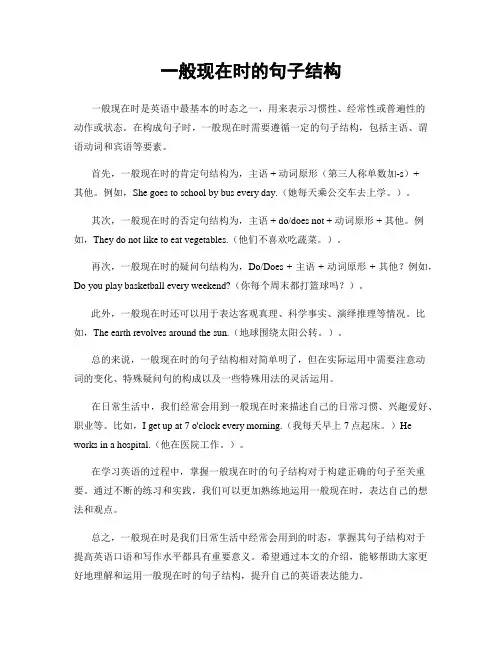
一般现在时的句子结构一般现在时是英语中最基本的时态之一,用来表示习惯性、经常性或普遍性的动作或状态。
在构成句子时,一般现在时需要遵循一定的句子结构,包括主语、谓语动词和宾语等要素。
首先,一般现在时的肯定句结构为,主语 + 动词原形(第三人称单数加-s)+其他。
例如,She goes to school by bus every day.(她每天乘公交车去上学。
)。
其次,一般现在时的否定句结构为,主语 + do/does not + 动词原形 + 其他。
例如,They do not like to eat vegetables.(他们不喜欢吃蔬菜。
)。
再次,一般现在时的疑问句结构为,Do/Does + 主语 + 动词原形 + 其他?例如,Do you play basketball every weekend?(你每个周末都打篮球吗?)。
此外,一般现在时还可以用于表达客观真理、科学事实、演绎推理等情况。
比如,The earth revolves around the sun.(地球围绕太阳公转。
)。
总的来说,一般现在时的句子结构相对简单明了,但在实际运用中需要注意动词的变化、特殊疑问句的构成以及一些特殊用法的灵活运用。
在日常生活中,我们经常会用到一般现在时来描述自己的日常习惯、兴趣爱好、职业等。
比如,I get up at 7 o'clock every morning.(我每天早上7点起床。
)He works in a hospital.(他在医院工作。
)。
在学习英语的过程中,掌握一般现在时的句子结构对于构建正确的句子至关重要。
通过不断的练习和实践,我们可以更加熟练地运用一般现在时,表达自己的想法和观点。
总之,一般现在时是我们日常生活中经常会用到的时态,掌握其句子结构对于提高英语口语和写作水平都具有重要意义。
希望通过本文的介绍,能够帮助大家更好地理解和运用一般现在时的句子结构,提升自己的英语表达能力。
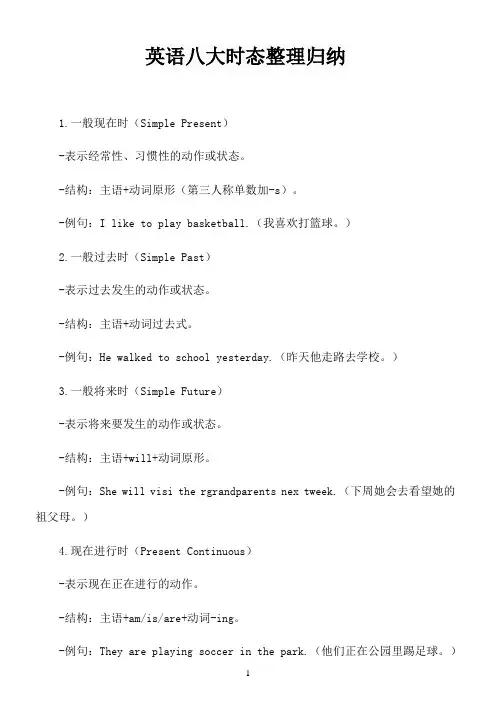
英语八大时态整理归纳1.一般现在时(Simple Present)-表示经常性、习惯性的动作或状态。
-结构:主语+动词原形(第三人称单数加-s)。
-例句:I like to play basketball.(我喜欢打篮球。
)2.一般过去时(Simple Past)-表示过去发生的动作或状态。
-结构:主语+动词过去式。
-例句:He walked to school yesterday.(昨天他走路去学校。
)3.一般将来时(Simple Future)-表示将来要发生的动作或状态。
-结构:主语+will+动词原形。
-例句:She will visi the rgrandparents nex tweek.(下周她会去看望她的祖父母。
)4.现在进行时(Present Continuous)-表示现在正在进行的动作。
-结构:主语+am/is/are+动词-ing。
-例句:They are playing soccer in the park.(他们正在公园里踢足球。
)5.过去进行时(Past Continuous)-表示过去某一时间正在进行的动作。
-结构:主语+was/were+动词-ing。
-例句:I was studying when she called me.(她给我打电话的时候,我正在学习。
)6.现在完成时(Present Perfect)-表示过去某个时间发生的动作对现在造成的影响。
-结构:主语+have/has+过去分词。
-例句:We have finished our homework.(我们已经完成了作业。
)7.过去完成时(Past Perfect)-表示过去某一时间之前已经发生的动作。
-结构:主语+had+过去分词。
-例句:He had already left when I arrived.(我到达时他已经离开了。
)8.将来完成时(Future Perfect)-表示将来某个时间之前已经完成的动作。
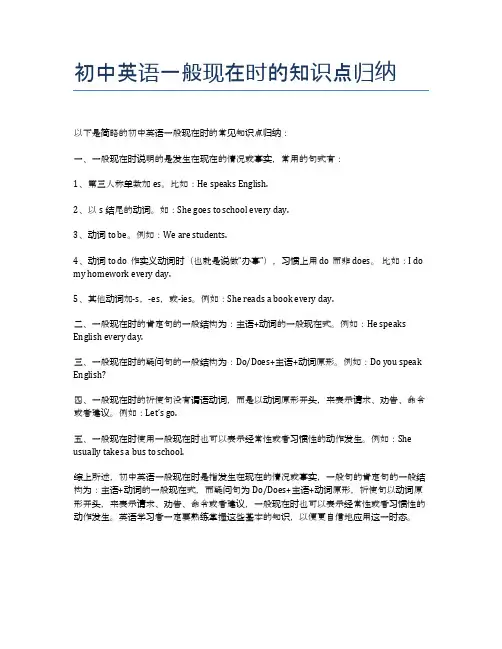
初中英语一般现在时的知识点归纳以下是简略的初中英语一般现在时的常见知识点归纳:一、一般现在时说明的是发生在现在的情况或事实,常用的句式有:1、第三人称单数加es。
比如:He speaks English.2、以s结尾的动词。
如:She goes to school every day.3、动词to be。
例如:We are students.4、动词to do作实义动词时(也就是说做“办事”),习惯上用do而非does。
比如:I do my homework every day.5、其他动词加-s,-es,或-ies。
例如:She reads a book every day.二、一般现在时的肯定句的一般结构为:主语+动词的一般现在式。
例如:He speaks English every day.三、一般现在时的疑问句的一般结构为:Do/Does+主语+动词原形。
例如:Do you speak English?四、一般现在时的祈使句没有谓语动词,而是以动词原形开头,来表示请求、劝告、命令或者建议。
例如:Let’s go.五、一般现在时使用一般现在时也可以表示经常性或者习惯性的动作发生。
例如:She usually takes a bus to school.综上所述,初中英语一般现在时是指发生在现在的情况或事实,一般句的肯定句的一般结构为:主语+动词的一般现在式,而疑问句为Do/Does+主语+动词原形,祈使句以动词原形开头,来表示请求、劝告、命令或者建议,一般现在时也可以表示经常性或者习惯性的动作发生。
英语学习者一定要熟练掌握这些基本的知识,以便更自信地应用这一时态。
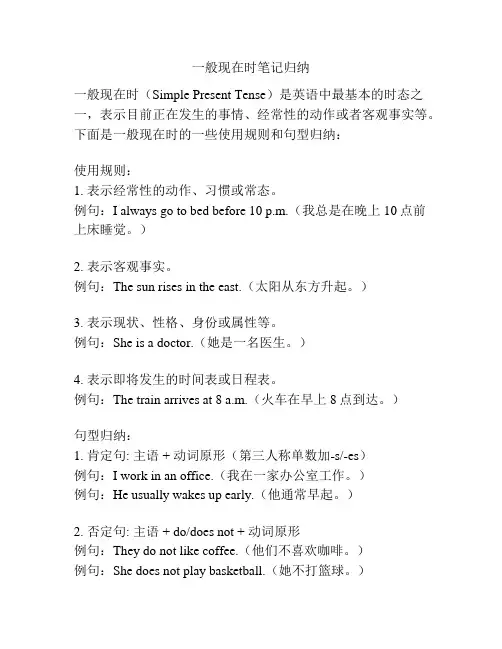
一般现在时笔记归纳一般现在时(Simple Present Tense)是英语中最基本的时态之一,表示目前正在发生的事情、经常性的动作或者客观事实等。
下面是一般现在时的一些使用规则和句型归纳:使用规则:1. 表示经常性的动作、习惯或常态。
例句:I always go to bed before 10 p.m.(我总是在晚上10点前上床睡觉。
)2. 表示客观事实。
例句:The sun rises in the east.(太阳从东方升起。
)3. 表示现状、性格、身份或属性等。
例句:She is a doctor.(她是一名医生。
)4. 表示即将发生的时间表或日程表。
例句:The train arrives at 8 a.m.(火车在早上8点到达。
)句型归纳:1. 肯定句: 主语 + 动词原形(第三人称单数加-s/-es)例句:I work in an office.(我在一家办公室工作。
)例句:He usually wakes up early.(他通常早起。
)2. 否定句: 主语 + do/does not + 动词原形例句:They do not like coffee.(他们不喜欢咖啡。
)例句:She does not play basketball.(她不打篮球。
)3. 疑问句: Do/Does + 主语 + 动词原形?例句:Do you like dogs?(你喜欢狗吗?)例句:Does he speak French?(他会说法语吗?)4. 祈使句: 动词原形(用于表示命令、建议、请求等)例句:Open the window, please.(请打开窗户。
)例句:Go to bed early.(早点上床睡觉。
)总结:一般现在时用于表示经常性的动作、客观事实、现状或即将发生的时间表等。
句子结构包括肯定句、否定句、疑问句和祈使句。
需要注意的是,第三人称单数在动词后面加上-s或-es。
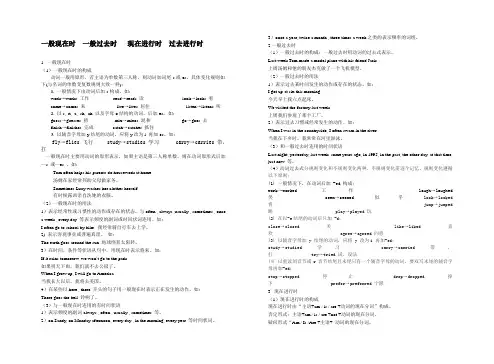
一般现在时一般过去时现在进行时过去进行时1. 一般现在时(1)一般现在时的构成动词一般用原形,若主语为单数第三人称,则动词加词尾-s或-es,具体变化规则如下(与名词的单数变复数规则大致一样):1.一般情况下由动词后加-s构成。
如:work→works 工作read→reads 读look→looks 看come→comes 来live→lives 居住listen→listens 听2.以s, x, z, sh, ch 以及字母o结构的动词,后加-es。
如:guess→guesses 猜mix→mixes 混和go→goes 去finish→finishes 完成catch→catches 抓住3.以辅音字母加y结尾的动词,应将y改为i 再加-es。
如:fly→flies 飞行study→studies 学习carry→carries 带,扛一般现在时主要用动词的原形表示,如果主语是第三人称单数,则在动词原形式后加—s 或—es 。
如:Tom often helps his parents do housework at home.汤姆在家经常邦助父母做家务。
Sometimes Lucy washes her clothes herself.有时候露西亲自洗她的衣服。
(2)一般现在时的用法1)表示经常性或习惯性的动作或存在的状态。
与often , always ,usually , sometimes , once a week , every day 等表示频度的副词或时间状词连用。
如:I often go to school by bike. 我经常骑自行车去上学。
2) 表示客观事实或普遍真理。
如:The earth goes around the sun .地球绕着太阳转。
3)在时间、条件等状语从句中,用现在时表示将来。
如:If it rains tomorrow, we won’t go to the park.如果明天下雨,我们就不去公园了。
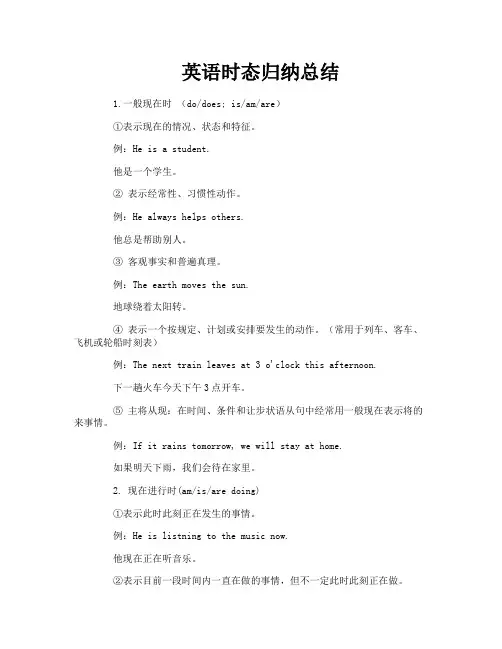
英语时态归纳总结1.一般现在时(do/does; is/am/are)①表示现在的情况、状态和特征。
例:He is a student.他是一个学生。
② 表示经常性、习惯性动作。
例:He always helps others.他总是帮助别人。
③ 客观事实和普遍真理。
例:The earth moves the sun.地球绕着太阳转。
④ 表示一个按规定、计划或安排要发生的动作。
(常用于列车、客车、飞机或轮船时刻表)例:The next train leaves at 3 o'clock this afternoon.下一趟火车今天下午3点开车。
⑤ 主将从现:在时间、条件和让步状语从句中经常用一般现在表示将的来事情。
例:If it rains tomorrow, we will stay at home.如果明天下雨,我们会待在家里。
2. 现在进行时(am/is/are doing)①表示此时此刻正在发生的事情。
例:He is listning to the music now.他现在正在听音乐。
②表示目前一段时间内一直在做的事情,但不一定此时此刻正在做。
例:I am studying computer this term.这个学期我一直在学习计算机。
③现在进行时可以表示将来的含义。
瞬时动词的进行一定表将来。
例: I am leaving.我要离开了。
持续动词的进行只有有将来的时间状语或有将来语境中才表将来。
例: I am travelling next month.下个月我要去旅行。
④现在进行时与频度副词连用,表示说话者或褒义或贬义的感情色彩。
例: He is always helping others.他总是帮助别人。
(褒义)3. 过去进行时(was/ were doing)①表示在过去一个具体的时间正在发生的动作。
例:Mary was listening to light music 10 minutes ago.10分钟前,玛丽正在听轻音乐。
一般现在时总结归纳现在时态是英语语法中最常用的时态之一,用来描述目前正在发生或经常发生的动作、状态或真理。
在本文中,我们将对一般现在时进行总结归纳,并提供一些例句和常用短语。
一、一般现在时的基本结构一般现在时的基本结构为主语 + 动词的原形。
当主语是第三人称单数时,需要在动词后加上-s或-es。
例如:1. I study English every day.(我每天学习英语。
)2. He works in a big company.(他在一家大公司工作。
)二、用法总结一般现在时有以下四种基本用法:1. 表示经常性的动作或习惯例如:- She always takes a walk in the park after dinner.(她每天晚饭后都去公园散步。
)- They usually go swimming on weekends.(他们通常在周末去游泳。
)2. 表示客观事实、普遍真理或科学事实例如:- The sun rises in the east.(太阳从东方升起。
)- Water boils at 100 degrees Celsius.(水在摄氏100度时沸腾。
)3. 表示现阶段的状态例如:- I live in Beijing.(我住在北京。
)- The book belongs to me.(这本书属于我。
)4. 表示评论和说话者的观点例如:- It seems that you are right.(看起来你是对的。
)- The movie is interesting.(这部电影很有趣。
)三、时间状语和频率副词在使用一般现在时时,可以借助时间状语和频率副词来更准确地表达时间和频率。
以下是一些常用的时间状语和频率副词:1. 时间状语- every day(每天)- on Sundays(在周日)- in the morning(在早上)- at night(在晚上)- at present(目前)- now(现在)- this week(这周)2. 频率副词- always(经常)- usually(通常)- often(经常)- sometimes(有时)- rarely(很少)- never(从不)例如:- I often go shopping on weekends.(我经常在周末去购物。
英语一般现在时的句子结构
一般现在时是用来描述经常性或习惯性的动作、事实或真理的时态。
在构造一般现在时的句子时,通常需要遵循以下结构:
肯定句:
主语 + 动词原形(第三人称单数时需在动词后加-s或-es)+ 其他。
例如:
I play football every Saturday.
She eats breakfast at 7 o'clock every morning.
The sun rises in the east.
否定句:
主语 + 动词原形的否定形式(do/does not + 动词原形)+ 其
他。
例如:
I do not play basketball.
She does not like coffee.
Cats do not like water.
疑问句:
助动词do/does + 主语 + 动词原形 + 其他?
例如:
Do you speak English?
Does she work on weekends?
Do they play the guitar?
特殊疑问句:
特殊疑问词 + 助动词do/does + 主语 + 动词原形 + 其他?
例如:
Where do you live?
What does she do for a living?
How often do they go to the gym?
除了以上基本的句子结构外,一般现在时还可以与时间状语、频率副词等连用,以丰富句子的表达方式。
希望这些信息能够帮助到你理解一般现在时的句子结构。
初二英语知识点总结归纳上册人教版一、语法知识点。
1. 一般现在时。
- 概念:表示经常或习惯性的动作或状态,也可表示客观事实或普遍真理。
- 结构:- 主语 + be动词(am/is/are)+ 其他。
例如:I am a student.- 主语(非第三人称单数)+ 动词原形 + 其他。
例如:They play football every day.- 主语(第三人称单数)+ 动词第三人称单数形式(一般在动词原形后加 -s或-es)+ 其他。
例如:He likes reading.- 标志词:often, usually, always, sometimes, every day/week/month等。
2. 形容词的比较级和最高级。
- 比较级的构成:- 一般在形容词后加 -er。
例如:tall - taller。
- 以不发音的e结尾的形容词,加 -r。
例如:nice - nicer。
- 以重读闭音节结尾且末尾只有一个辅音字母的形容词,双写这个辅音字母再加-er。
例如:big - bigger。
- 以“辅音字母 + y”结尾的形容词,把y变为i再加 -er。
例如:heavy - heavier。
- 不规则变化:good/well - better; bad/ill - worse; many/much - more 等。
- 比较级的用法:- 表示两者之间的比较,常用结构“比较级+than”。
例如:He is taller than me.- 最高级的构成:- 一般在形容词后加 -est。
例如:tall - tallest。
- 以不发音的e结尾的形容词,加 -st。
例如:nice - nicest。
- 以重读闭音节结尾且末尾只有一个辅音字母的形容词,双写这个辅音字母再加-est。
例如:big - biggest。
- 以“辅音字母 + y”结尾的形容词,把y变为i再加 -est。
例如:heavy - heaviest。
一般现在时基本结构:通常与副词every day(每天),always(总是),usually(通常),often(经常)sometimes(有时),等时间状语连用。
1.表示事物或人物的特征、状态。
例句:The sky is blue.天空是蓝色的。
2.表示经常性或习惯性的动作。
例句:I get up at six every day.我每天六点起床。
3.表示客观现实。
例句:The table has four legs.桌子有四条腿。
4.表示客观真理,科学原理,自然现象,等客观事实或格言谚语等。
例句:The earth goes around the sun.地球绕着太阳转。
一般现在时的用法:1.表示经常性或习惯性的动作或存在的状态;表示客观事实或普遍真理;在时间、条件等状语从句中,用现在时表示将来;在某些以here,there开头的句子中,用一般现在时表示正在发生的动。
例句:He is twelve.他十二岁了。
I go to school at seven every day.我每天七点去上学。
2.一般现在时常和表示时间的频度副词连用。
如:often, usually, sometimes, always, never等。
例句:I often read books in the evening.我经常在晚上读书。
Do they usually go to school by bike?他们通常骑自行车去上学吗?He doesn’t like milk. He never drinks it.他不喜欢牛奶。
他从来不喝它。
Sometimes my mother gets back at five.有时候妈妈五点钟回来。
3.一般现在时也常和以下时间表达法连用。
例句:Do they have math in the morning?他们早上有数学课吗?She sleeps nine hours every night.她每晚睡九个小时。
初中英语六大时态归纳初中英语六大时态是英语语法中的重要内容,掌握这六大时态对于学习英语至关重要。
以下是初中英语六大时态的详细介绍:一、一般现在时(Simple Present Tense)1. 定义:一般现在时用来描述习惯性动作、普遍真理或状态。
2. 结构:主语+ 动词原形。
3. 举例:He goes to school every day.(他每天去上学。
)二、一般过去时(Simple Past Tense)1. 定义:一般过去时用来描述过去发生的动作或状态。
2. 结构:主语+ 动词过去式。
3. 举例:She visited the museum yesterday.(她昨天参观了博物馆。
)三、一般将来时(Simple Future Tense)1. 定义:一般将来时用来描述将来发生的动作或计划、打算。
2. 结构:主语+ would/could/might/should + 动词原形。
3. 举例:I will go to the beach this weekend.(我这个周末将去海滩。
)四、现在进行时(Present Continuous Tense)1. 定义:现在进行时用来描述正在进行的动作或当前存在的状态。
2. 结构:主语+ am/is/are + 动词现在分词。
3. 举例:She is reading a book now.(她现在正在读书。
)五、过去进行时(Past Continuous Tense)1. 定义:过去进行时用来描述过去某一时刻正在进行的动作。
2. 结构:主语+ was/were + 动词现在分词。
3. 举例:He was watching TV when I called him.(当我给他打电话时,他正在看电视。
)六、现在完成时(Present Perfect Tense)1. 定义:现在完成时用来描述过去发生的动作对现在造成的影响或结果。
2. 结构:主语+ have/has + 过去分词。
英语一般现在时结构归纳英语是我们在很多地方都通用的哦,今天小编就给大家分享一下英语的知识大全,欢迎大家阅读英语知识常用结构:1.主语+谓语+其他(表动作)It never snows in Australia in December.澳大利亚的12月里从来不下雪。
They usually go to school by bike.他们通常骑自行车上学。
He writes to his father twice a month.他每月写两次信给他爸爸。
2.主语+be+表语(表状态)He is a student.他是学生。
ⅠBe动词的一般现在时主语+be(am , is , are)+其它肯定句式:主语+be( am, is, are)+其它. 如,The color is blue.否定句式:主语+be(am, is, are) +not +其它.如,The color is not blue.一般疑问句:Be(am, is, are) +主语+其它?.注:在这种构成中,be动词有人称和数的变化,即要根据主语选用am / is / are。
Be动词分为单数和复数,am和is是表示单数,am只跟I搭配(除了I其余的单数都用is),are表示复数。
Ⅱ 实义动词的一般现在时① 主语(第三人称单数)+动词(第三人称单数形式)+其它肯定句式:主语(第三人称单数)+动词(第三人称单数形式)+其它,如,He likes it否定句式:主语(第三人称单数)+doesn’t+动词(原形)+其它.如:He dosen't like it.一般疑问句:Does+主语(第三人称单数)+动词(原形)+其它? Does he like it?② 主语(除了第三人称单数)+动词(原形)+其它肯定句式:主语(除了第三人称单数)+动词(原形)+其它如:I like it 否定句式:主语(除了第三人称单数)+don’t+动词(原形)+其它.如:I don't like it.一般疑问句:Do+主语(除了第三人称单数)+动词(原形)+其它? Do you know it.注:do、don’t和does、doesn’t是构成一般现在时的助动词,其特点是要在其后跟动词的原形。
英语一般现在时结构归纳
英语是我们在很多地方都通用的哦,今天小编就给大家分享一下英语的知识大全,欢迎大家阅读
英语知识
常用结构:
1.主语+谓语+其他(表动作)
It never snows in Australia in December.
澳大利亚的12月里从来不下雪。
They usually go to school by bike.
他们通常骑自行车上学。
He writes to his father twice a month.
他每月写两次信给他爸爸。
2.主语+be+表语(表状态)
He is a student.
他是学生。
ⅠBe动词的一般现在时
主语+be(am , is , are)+其它
肯定句式:主语+be( am, is, are)+其它. 如,The color is blue.
否定句式:主语+be(am, is, are) +not +其它.如,The color is not blue.
一般疑问句:Be(am, is, are) +主语+其它?.
注:在这种构成中,be动词有人称和数的变化,即要根据主语选用am / is / are。
Be动词分为单数和复数,am和is是表示单数,am只跟I搭配(除了I其余的单数都用is),are表示复数。
Ⅱ实义动词的一般现在时
①主语(第三人称单数)+动词(第三人称单数形式)+其它
肯定句式:主语(第三人称单数)+动词(第三人称单数形式)+其它,如,He likes it
否定句式:主语(第三人称单数)+doesnt+动词(原形)+其它.如:He dosent like it.
一般疑问句:Does+主语(第三人称单数)+动词(原形)+其它? Does he like it?
②主语(除了第三人称单数)+动词(原形)+其它
肯定句式:主语(除了第三人称单数)+动词(原形)+其它如:I like it
否定句式:主语(除了第三人称单数)+dont+动词(原形)+其它.如:I dont like it.
一般疑问句:Do+主语(除了第三人称单数)+动词(原形)+其它? Do you know it.
注:do、dont和does、doesnt是构成一般现在时的助动词,其特点是要在其后跟动词的原形。
现在一般时习题:
1. He________ TV every evening. (watch)
2. We always ________ to school on foot. (go)
3. Tom, with his classmates, often ______ football after school. (play)
4. Their classroom _________ four big windows. (have)
5. Your shoes _______ under the bed. (be)
6. Sorry, I_______ no enough money with me now. (have)
7. His uncle usually _________ to work by bus. (go)
8. There _______ no hospitals here ten years ago. (be)
9. I always ______ up at six in the morning, but I _____up a little later yesterday. (get )
10. She _______ swim very well when she was five years old. (can)。